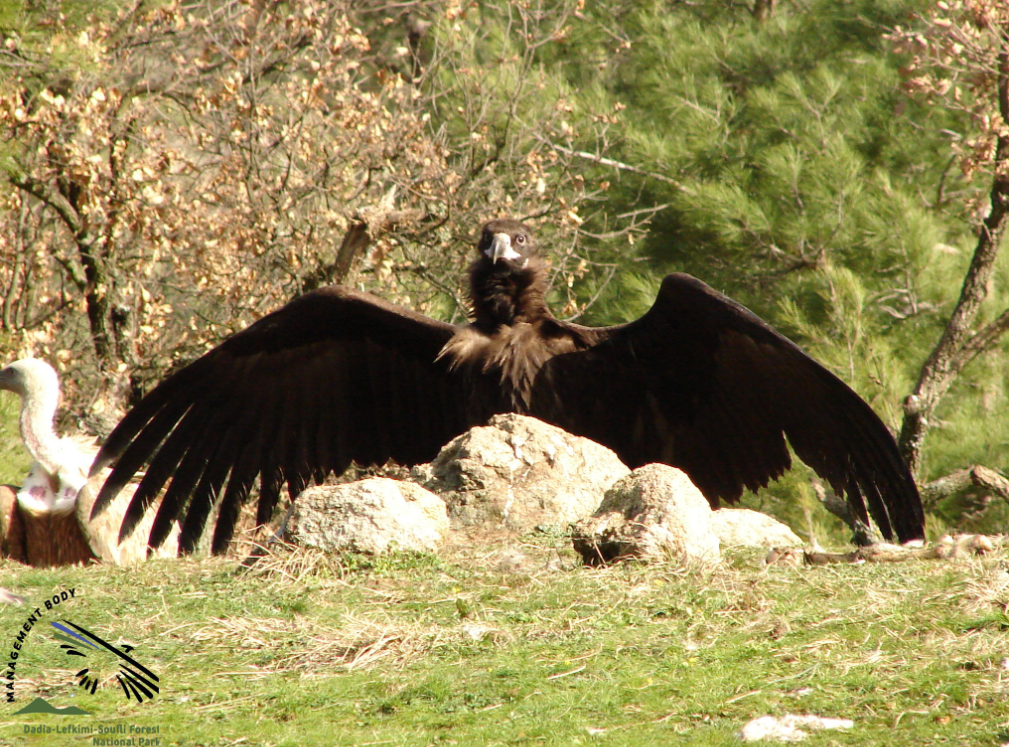
The Dadia-Lefkimi-Soufli Forest National Park, where the only breeding colony of Cinereous Vultures remains, is situated in northeastern Greece, close to the borders with Bulgaria and Turkey. Their breeding season started early in the year, and now the first Cinereous Vulture chicks came to life! The white and fluffy chicks hatched in their large nests and are under the constant supervision of their parents in Dadia Forest!
Cinereous Vulture Breeding Season
The Cinereous Vulture is the largest bird of prey in Europe. It nests in old forests, on remote wide treetops, on mainly black pines. The breeding period of Cinereous Vultures is quite long. Breeding pairs lay only one egg each season, in late February to early March, and the incubation of the egg lasts about 55-60 days. At the end of April and the beginning of May, the chick hatches. The parents take care of the chick for around 100-115 days, until it fledges and leaves the nest in late August to early September.
Cinereous Vultures in Dadia Forest
Today, the Dadia-Lefkimi-Soufli Forest National Park, in Greece, hosts the only Cinereous Vulture breeding population in the whole of the Balkan Peninsula. There are currently 30-35 breeding pairs and about 130 individuals in Dadia. The team at Dadia closely monitors the Cinereous Vultures to evaluate the breeding season.
According to the Red Book of Endangered Animals of Greece (2009), the Cinereous Vulture is considered an endangered species. Despite continuous efforts to adequately protect it, the species still faces several threats that either lead to the immediate death of individuals or a gradual reduction in the quality of their habitat. These include the decrease of extensive livestock farming, which also leads to a decline in food availability for vultures. Another important threat is the systematic installation of energy infrastructure, such as wind farms, in critical areas to the species, where species are injured or killed through electrocution or collision. One of the most severe threats includes the illegal use of poisoned baits that, unfortunately, are still widely used in Greece and the Balkans today. The VCF’s Balkan Anti-Poisoning Project works with national organisations and authorities across six countries in the Balkans, including Greece, to tackle illegal wildlife poisoning, which prevents the comeback of vultures in the region.
Cinereous Vultures in the Balkans
Once a common sight in the Balkans until the 1930s, the population of Europe’s largest vulture declined steadily until the species was declared extinct across most countries in the region in the 1980s, with only a small population of 30-35 pairs remaining in Greece’s Dadia National Park. Despite the proximity to the colony in Greece, the species is not thought to have bred in Bulgaria, or any other Balkan state for decades. There are currently several conservation actions aiming to boost the Cinereous Vulture population in the Balkan Peninsula.
The LIFE Re-Vultures project aims to recover and further expand the Cinereous and Griffon Vulture populations in the cross-border Rhodope Mountains, mainly by improving natural prey availability and reducing mortality factors such as poaching, poisoning, electrocution and collision with power lines. Cinereous Vultures that breed in Dadia Forest in Greece forage in Bulgaria and Griffon Vultures that breed in Bulgaria feed in Greece.
Furthermore, the Vultures Back To LIFE project now works to establish a nesting population of the species by tackling main threats and releasing Cinereous Vultures to key areas in the wild. The goal is to restore the connections between the sub-populations of this species in the Balkans (Greece), Crimea, the Alps and the Iberian Peninsula. So far, the population of the species is gradually increasing, with the first pair officially formed in 2020 by two reintroduced vultures since the species extinction in Bulgaria.
We will share how many Cinereous Vultures hatched and fledged during this breeding season in Dadia-Lefkimi-Soufli Forest National Park in the upcoming months. Make sure you follow us on Facebook and Twitter to stay tuned!







